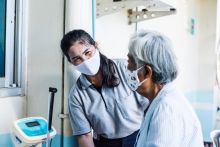Purchasing arrangements to strengthen quality health services for chronic diseases

November 2021 to December 2023
WHO Kobe Centre (Japan) in collaboration with the WHO Department of Health System Governance and Financing (Switzerland) and the Organisation for Economic Co-operation and Development (OECD)(France); The George Institute for Global Health (Australia); Institute of Tropical Medicine Antwerp (Belgium); Mesylab SRL (Belgium); Global Health Research Center, Duke Kunshan University (China); and Center for Health Policy and Management, Gadjah Mada University (Indonesia).
Other participating partners: WHO Regional Offices; University of Technology Sydney (Australia); Health Policy Analysis (Australia); University of Sydney (Australia); Institute of Health Policy, Management and Evaluation, University of Toronto (Canada); Health Economics Department, University of Valparaiso (Chile); Data Science for Health Services and Policy Research, Institute for Health Sciences in Aragon (Spain).
Global
Background
Improving the quality of care for people with chronic conditions is central to advancing universal health coverage, given the large burden of premature mortality from noncommunicable diseases.
Goal
To describe experiences with purchasing arrangements and payment methods and how they have been used to improve quality and better health outcomes for people with chronic conditions.
Methods
- Scoping review of the literature and other systematic reviews were conducted to identify the effects of payment methods on process quality and outcomes for chronic care.
- Eight case studies were commissioned to describe implementation arrangements for payment methods that reward quality in chronic care in Australia, Canada, Chile, China, Germany, Indonesia, South Africa and Spain.
Key Findings
- A common challenge was balancing the incentives in blended payment methods, i.e. a combination of two or more payment methods.
- Very little information was published about the decisions made to distribute payments across and within teams, which may create uncertainty among health care providers.
- A mix of process and outcomes measures were used in all studies, with a reliance on information collected by existing administrative systems.
- Only two schemes were independently evaluated and peer reviewed, and these evaluations faced important methodological challenges, including selection bias.
- Key facilitating and inhibiting factors included those related to governance, service delivery, quality standards, the health information infrastructure, as well as the financial and regulatory environments.
Global Implications
There is a need to learn from past experiences about the design and evaluation of payment methods, including how lessons learned can be systematically adapted across different country contexts. While proactive learning takes time and effort – particularly across countries and among different stakeholders – it is essential to share experiences to avoid continually repeating mistakes and implementation failures.
Local implications
Relevant initiatives from the Kansai region can further inform these findings including payment for performance initiatives.
Publications
Summary report
Purchasing for quality chronic care: summary report. Geneva: World Health Organization, Organisation for Economic Co-operation and Development; 2023. https://iris.who.int/handle/10665/373217. Licence: CC BY-NC-SA 3.0 IGO.
Policy brief series (*Use PDF links at the end of this page to download individual policy briefs)
Purchasing for quality chronic care: policy brief series. Geneva: World Health Organization, Organisation for Economic Co-operation and Development; 2023. https://iris.who.int/handle/10665/373273. Licence: CC BY-NC-SA 3.0 IGO.
Case studies
Australia
Hall J, van Gool K, Haywood P, Pearse J, Mazevska D, Yu S et al. Australian Health Care Homes trial: case study. Geneva: World Health Organization, Organisation for Economic Co-operation and Development; 2023. https://iris.who.int/handle/10665/373192. Licence: CC BY-NC-SA 3.0 IGO.
Canada
Wodchis WP, Rashidian L. Integrated Comprehensive Care programme in Ontario, Canada: case study. Geneva: World Health Organization, Organisation for Economic Co-operation and Development; 2023. https://iris.who.int/handle/10665/373213. Licence: CC BY-NC-SA 3.0 IGO.
Chile
Urriola R, Larrain N. Effect of the payment mix for primary care services on the quality of chronic care in Chile: case study. Geneva: World Health Organization, Organisation for Economic Co-operation and Development; 2023. https://iris.who.int/handle/10665/373214. Licence: CC BY-NC-SA 3.0 IGO.
China
Long Q, Jia Y, Li J, Lou Z, Liu Y. National Basic Public Health Services Programme in China: case study. Geneva: World Health Organization, Organisation for Economic Co-operation and Development; 2023. https://iris.who.int/handle/10665/373220. Licence: CC BY-NC-SA 3.0 IGO.
Germany
Lindner LE. Healthy Kinzigtal Programme in Germany: case study. Geneva: World Health Organization, Organisation for Economic Co-operation and Development; 2023. https://iris.who.int/handle/10665/373210. Licence: CC BY-NC-SA 3.0 IGO.
Indonesia
Nappoe SA, Djasri H, Kurniawan MF. Chronic disease management programme (PROLANIS) in Indonesia: case study. Geneva: World Health Organization, Organisation for Economic Co-operation and Development; 2023. https://iris.who.int/handle/10665/373226. Licence: CC BY-NC-SA 3.0 IGO.
South Africa
Smith A, Mosam A. Value Care Team model in South Africa: case study. Geneva: World Health Organization, Organisation for Economic Co-operation and Development; 2023. https://iris.who.int/handle/10665/373212. Licence: CC BY-NC-SA 3.0 IGO.
Spain
Bernal-Delgado E, Angulo-Pueyo E. Purchasing arrangements to strengthen the quality of chronic care in three Spanish autonomous communities: case study. Geneva: World Health Organization, Organisation for Economic Co-operation and Development; 2023. https://iris.who.int/handle/10665/373225. Licence: CC BY-NC-SA 3.0 IGO.
Individual policy briefs:

